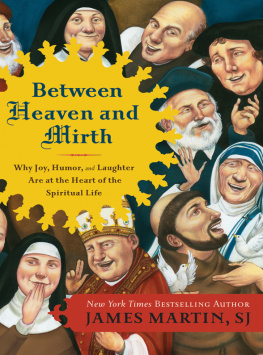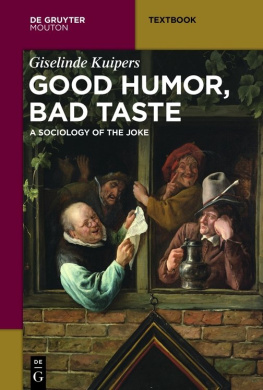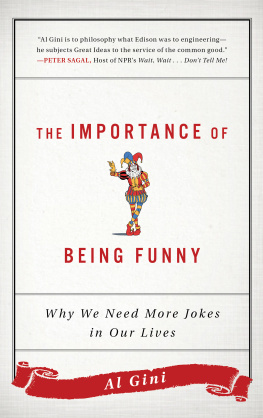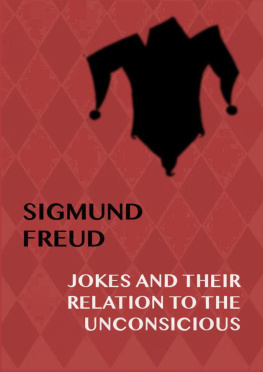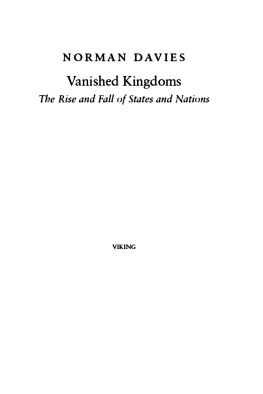First published 2002 by Transaction Publishers
Published 2017 by Routledge
2 Park Square, Milton Park, Abingdon, Oxon OX14 4RN
711 Third Avenue, New York, NY 10017, USA
Routledge is an imprint of the Taylor & Francis Group, an informa business
Copyright 2002 by Taylor & Francis.
All rights reserved. No part of this book may be reprinted or reproduced or utilised in any form or by any electronic, mechanical, or other means, now known or hereafter invented, including photocopying and recording, or in any information storage or retrieval system, without permission in writing from the publishers.
Notice:
Product or corporate names may be trademarks or registered trademarks, and are used only for identification and explanation without intent to infringe.
Library of Congress Catalog Number: 2001027884
Library of Congress Cataloging-in-Publication Data
Davies, Christie.
The mirth of nations/Christie Davies.
p. cm.
Includes bibliographical references and index.
ISBN 978-0-7658-0096-1 (cloth); 978-1-4128-1457-7 (paper)
1. Ethnic wit and humor. I. Title.
PN6149.E83 D395 2002
818.60208dc21
2001027884
ISBN 13: 978-1-4128-1457-7 (pbk)
ISBN 13: 978-0-7658-0096-1 (hbk)
This book was written with the help of research grants which enabled me to work in several different countries where I was, in turn, greatly assisted by local scholars. I wish to acknowledge funding from the Canadian Department of Foreign Affairs and Trade to work on materials in M.U.N.F.L.A., the Memorial University of Newfoundland Folklore Archive, in the Universit de Moncton, the Universit Laval and the Muse de LHumeur in Montral; in each institution the librarians and archivists were exceptionally supportive and helpful. I also owe a special debt to Peter Narvez, Paul Smith, and Gerald Thomas of the University of Newfoundland for their advice and support. I also record here the assistance given to me by the Reading University Research Board to visit Australia, and my thanks to the staff of the State Library of New South Wales in Sydney and also to Jessica Milner-Davis and Gerard Matte for their advice and encouragement. I must also acknowledge the assistance of the Arts and Humanities Research Board UK whose grant enabled me to work in California and Utah on the folklore archives at the University of California at Berkeley and at Brigham Young University and in the Fife Folklore archive at Utah State University and the Schmulowitz library in San Francisco public library. Alan Dundes was outstanding in the liberality with which he granted me access to the collections and in the interest he took in my research, and Anthea Grimes and her colleagues helped me to derive the maximum benefit from the Schmulowitz collection. I was lucky to be working in California at the same time as two distinguished European humor scholars, Anna Litovkina and Willibald Ruch, with whom I could discuss work in progress.
Many of the ideas incorporated in the different chapters were in each case first explored with audiences in the territories of the national, ethnic or regional group concerned, including Australia, Scotland and Newfoundland. In addition, I was able, with the assistance of the British Council, to lecture at the Jagiellonian University of Krakw in Poland and on a later occasion at Opole University as well. Wladyslaw Chlopicki of the Jagiellonian University of Krakw has given me a great deal of help and advice over many years and Dorota Brzozowska and Stanislaw Gajda of Opole University have also been most supportive.
In Israel, thanks to Avner Ziv, I was able to take part in a symposium on Jewish humor at Tel Aviv University and thanks to Ernest Krausz in a symposium on Jewish identity at Bar Ilan University. It was at the latter that I first met Irving Louis Horowitz and Mary Curtis, both of whom encouraged me to write this book. I must further thank them and their colleagues at Transaction, notably Anne Schneider, for their kindness as well as hard work in seeing this book through to publication.
Early versions of the ideas expressed here about Jewish humor were first explored with audiences at the Jewish Cultural Foundation in Krakw, the Spiro Institute, Manchester University, the Institute of Jewish Studies at University College London and the School of Oriental and African Studies of the University of London, and I must express my appreciation to those who invited me and to the audiences who provided critical but helpful comments. Even though I have been studying Jewish humor for nearly twenty years, writing about it has required consultation with those of greater experience as well as knowledge. I must thank Emil Draitser, Elliott Oring, Victor Raskin, Rabbi Barry Schechter, Roy Wolfe, and Anat Zajdman for their patient willingness to answer questions, their wise advice and, indeed, their welcome friendship over many years. None of them is, of course, responsible for any errors I may have made in this field.
The Scottish materials I have used are based on a number of foraging visits to Scotland. I must also thank my audiences at University College Dublin and at the Social History Society conference at Glasgow University and for their helpful comments on my lectures on Scottish humor. In particular, I must thank Stephen Mennell and his colleagues for inviting me to Dublin to lecture and the British Council for funding my visit. I also owe a debt to the Japanese Society for Laughter and Humor Studies and to Hiroshi Inoue for helping to make possible my two visits to Osaka. I must add that my work in Japan would have been quite impossible without the help of Goh Abe, a valued collaborator for many years past.
It is appropriate also to note here the value and importance of ISHS, the International Society for Humor Studies, to humor scholars and, in particular, Victor Raskin, Don and Alleen Nilsen, and Larry Mintz, who have over many years worked hard to provide humor scholars with a forum, a place to meet, and one in which to exchange ideas.
Many of the ideas expressed in this book were first explored at conferences organized under the aegis of ISHS. An earlier version of was published in the journal, Humor, the International Journal of Humor Research , the worlds leading humor research journal, and the helpful comments I subsequently received led me to revise considerably my perception of the relationship between jokers and those joked about.
The manuscript was word-processed by Helen Davis. I am grateful to her for her speed, accuracy and good nature. These qualities were especially needed in the final stages of checking the manuscript, and at this point I also relied on the erudition of John Davies, Jon Doust, Brian Kemp, Ronald Knowles, and David Martin. Any errors that remain are my own.
My final acknowledgements are, as in my previous books, to my cousin David Williams of Oakland, California, for his hospitality and to Janetta Davies for all manner of continuing help, support, and encouragement. Let me also remember here my father Christy Davies who first encouraged me to take humor seriously and whose memory continues to inspire my work.




